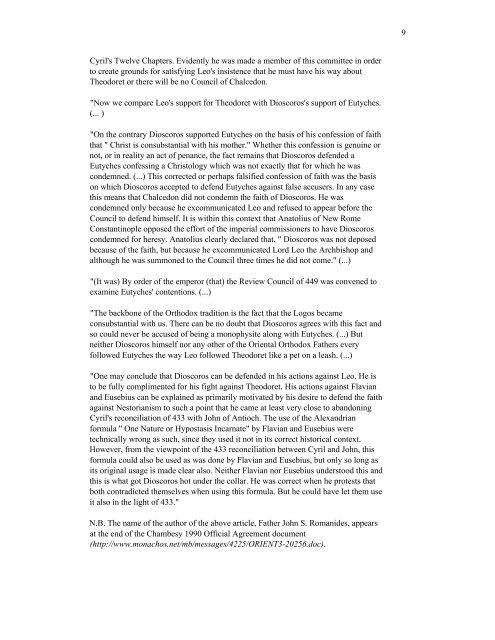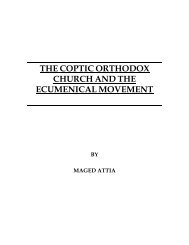Coptic interpretations of the Fourth Ecumenical Council - Saint Mina ...
Coptic interpretations of the Fourth Ecumenical Council - Saint Mina ...
Coptic interpretations of the Fourth Ecumenical Council - Saint Mina ...
You also want an ePaper? Increase the reach of your titles
YUMPU automatically turns print PDFs into web optimized ePapers that Google loves.
Cyril's Twelve Chapters. Evidently he was made a member <strong>of</strong> this committee in order<br />
to create grounds for satisfying Leo's insistence that he must have his way about<br />
Theodoret or <strong>the</strong>re will be no <strong>Council</strong> <strong>of</strong> Chalcedon.<br />
"Now we compare Leo's support for Theodoret with Dioscoros's support <strong>of</strong> Eutyches.<br />
(... )<br />
"On <strong>the</strong> contrary Dioscoros supported Eutyches on <strong>the</strong> basis <strong>of</strong> his confession <strong>of</strong> faith<br />
that " Christ is consubstantial with his mo<strong>the</strong>r." Whe<strong>the</strong>r this confession is genuine or<br />
not, or in reality an act <strong>of</strong> penance, <strong>the</strong> fact remains that Dioscoros defended a<br />
Eutyches confessing a Christology which was not exactly that for which he was<br />
condemned. (...) This corrected or perhaps falsified confession <strong>of</strong> faith was <strong>the</strong> basis<br />
on which Dioscoros accepted to defend Eutyches against false accusers. In any case<br />
this means that Chalcedon did not condemn <strong>the</strong> faith <strong>of</strong> Dioscoros. He was<br />
condemned only because he excommunicated Leo and refused to appear before <strong>the</strong><br />
<strong>Council</strong> to defend himself. It is within this context that Anatolius <strong>of</strong> New Rome<br />
Constantinople opposed <strong>the</strong> effort <strong>of</strong> <strong>the</strong> imperial commissioners to have Dioscoros<br />
condemned for heresy. Anatolius clearly declared that, " Dioscoros was not deposed<br />
because <strong>of</strong> <strong>the</strong> faith, but because he excommunicated Lord Leo <strong>the</strong> Archbishop and<br />
although he was summoned to <strong>the</strong> <strong>Council</strong> three times he did not come." (...)<br />
"(It was) By order <strong>of</strong> <strong>the</strong> emperor (that) <strong>the</strong> Review <strong>Council</strong> <strong>of</strong> 449 was convened to<br />
examine Eutyches' contentions. (...)<br />
"The backbone <strong>of</strong> <strong>the</strong> Orthodox tradition is <strong>the</strong> fact that <strong>the</strong> Logos became<br />
consubstantial with us. There can be no doubt that Dioscoros agrees with this fact and<br />
so could never be accused <strong>of</strong> being a monophysite along with Eutyches. (...) But<br />
nei<strong>the</strong>r Dioscoros himself nor any o<strong>the</strong>r <strong>of</strong> <strong>the</strong> Oriental Orthodox Fa<strong>the</strong>rs every<br />
followed Eutyches <strong>the</strong> way Leo followed Theodoret like a pet on a leash. (...)<br />
"One may conclude that Dioscoros can be defended in his actions against Leo. He is<br />
to be fully complimented for his fight against Theodoret. His actions against Flavian<br />
and Eusebius can be explained as primarily motivated by his desire to defend <strong>the</strong> faith<br />
against Nestorianism to such a point that he came at least very close to abandoning<br />
Cyril's reconciliation <strong>of</strong> 433 with John <strong>of</strong> Antioch. The use <strong>of</strong> <strong>the</strong> Alexandrian<br />
formula " One Nature or Hypostasis Incarnate" by Flavian and Eusebius were<br />
technically wrong as such, since <strong>the</strong>y used it not in its correct historical context.<br />
However, from <strong>the</strong> viewpoint <strong>of</strong> <strong>the</strong> 433 reconciliation between Cyril and John, this<br />
formula could also be used as was done by Flavian and Eusebius, but only so long as<br />
its original usage is made clear also. Nei<strong>the</strong>r Flavian nor Eusebius understood this and<br />
this is what got Dioscoros hot under <strong>the</strong> collar. He was correct when he protests that<br />
both contradicted <strong>the</strong>mselves when using this formula. But he could have let <strong>the</strong>m use<br />
it also in <strong>the</strong> light <strong>of</strong> 433."<br />
N.B. The name <strong>of</strong> <strong>the</strong> author <strong>of</strong> <strong>the</strong> above article, Fa<strong>the</strong>r John S. Romanides, appears<br />
at <strong>the</strong> end <strong>of</strong> <strong>the</strong> Chambesy 1990 Official Agreement document<br />
(http://www.monachos.net/mb/messages/4225/ORIENT3-20256.doc).<br />
9








